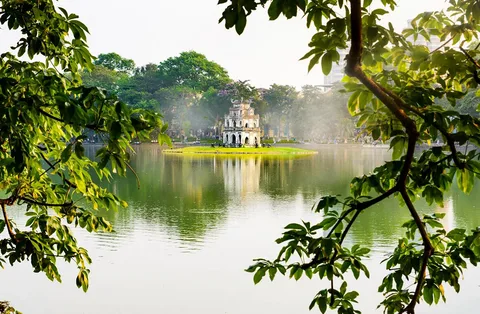Hanoi, Vietnam’s capital, is more than just a bustling city—it’s a living museum of history, traditions, and artistry that has evolved over centuries. Every corner tells a story, from the scent of steaming bowls of pho drifting through ancient alleyways to the rhythmic tapping of traditional water puppeteers preparing for their next show. This is a city where the old and new dance in harmony, creating an atmosphere that feels both timeless and vibrant.
For travelers, Hanoi isn’t just a stop on the map—it’s the soul of the country, the place where you can truly feel Vietnam’s cultural heartbeat. Whether you’re wandering through the Old Quarter’s maze-like streets or sipping strong Vietnamese coffee at a quiet lakeside café, the city wraps you in an embrace that blends warmth, charm, and authenticity.
A Living Timeline of Vietnamese History
Few places in Vietnam capture the nation’s history as vividly as Hanoi. Founded over a thousand years ago, the city has seen dynasties rise and fall, endured wars, and embraced rapid modernization. Its architecture reflects these layers of time: French colonial villas stand alongside traditional tube houses, while modern high-rises dot the skyline.
Landmarks such as the Ho Chi Minh Mausoleum, the Temple of Literature, and the Imperial Citadel of Thang Long remind visitors of the city’s deep historical significance. These sites aren’t just tourist attractions—they’re cultural symbols that connect Vietnam’s present to its storied past.
Why Hanoi Feels So Authentically Vietnamese
While many Vietnamese cities have modernized quickly, Hanoi has retained a deep connection to its traditions. Street markets still buzz with vendors selling fresh herbs, fish, and fragrant spices, while skilled artisans craft silk garments and lacquerware using methods passed down through generations.
The Old Quarter, with its narrow streets named after the goods once sold there, offers an unfiltered look at Hanoi’s daily life. It’s here you’ll see locals practicing tai chi at dawn, motorbikes weaving through tiny lanes, and elderly residents sitting on low stools sipping tea as they chat with neighbors.
For many travelers, booking a Hanoi tour package is the best way to experience this authenticity without missing hidden gems only locals know.
The City’s Artistic Soul
Hanoi is not just a guardian of history—it’s also a hub for creativity. The city has a thriving art scene, from traditional water puppet theaters to modern art galleries showcasing contemporary Vietnamese talent.
Music plays a big role in daily life too. You might hear the melancholic notes of a đàn bầu (monochord) drifting from a cultural center, or witness a lively folk performance during a festival. Artisans in hidden workshops still produce beautiful handmade goods, keeping traditional craftsmanship alive in an increasingly digital world.
A Culinary Capital
Food in Hanoi is more than just nourishment—it’s a cultural expression. The city’s cuisine blends the delicate flavors of northern Vietnam with a focus on freshness and balance. Signature dishes like pho, bun cha, and cha ca are not just meals but reflections of local heritage.
Street food culture thrives here, offering travelers a chance to taste authentic dishes at small family-run stalls. Eating in Hanoi isn’t about fancy settings—it’s about savoring flavors that have been perfected over decades. Many travelers seeking the best Vietnam tour package choose itineraries that include food-focused experiences in Hanoi, as it’s considered the ultimate introduction to Vietnamese cuisine.
Festivals That Bring the City Alive
Hanoi’s cultural heart beats even stronger during its many festivals. The Lunar New Year (Tet) transforms the city into a sea of blossoms, lanterns, and laughter. The Mid-Autumn Festival fills streets with colorful lantern processions and mooncake stalls. Traditional events like the Hanoi Traditional Craft Festival showcase the city’s dedication to preserving its heritage.
These festivals are not staged for tourists—they’re genuine community celebrations, giving visitors a chance to be part of something real and deeply rooted.
Modern Energy with Ancient Roots
What makes Hanoi special is its ability to embrace progress without losing its identity. New cafés, co-working spaces, and art installations are popping up across the city, yet traditions like morning market visits, temple offerings, and village festivals remain intact.
This balance creates a cultural richness that is rare in modern cities. Hanoi doesn’t just tell Vietnam’s story—it lives it every day.
FAQs About Hanoi’s Cultural Appeal
1.What makes Hanoi the cultural heart of Vietnam?
Hanoi blends centuries-old traditions, historical landmarks, thriving arts, and a rich culinary heritage, offering a complete picture of Vietnam’s identity.
2. How can I experience authentic Hanoi culture?
Explore the Old Quarter, visit traditional markets, attend a water puppet show, and sample local street food. Guided tours within a Hanoi tour package often include these highlights.
3. Is Hanoi a good starting point for a Vietnam trip?
Yes. Many travelers start in Hanoi to understand Vietnam’s culture before exploring other regions. The city’s accessibility and depth make it an ideal first stop.
4. Which festivals in Hanoi are worth attending?
Tet (Lunar New Year), the Mid-Autumn Festival, and local craft festivals offer vibrant cultural experiences.
5. How long should I stay in Hanoi to explore its culture?
A minimum of three days is ideal, giving enough time to explore major landmarks, taste local dishes, and enjoy the city’s unique atmosphere.

